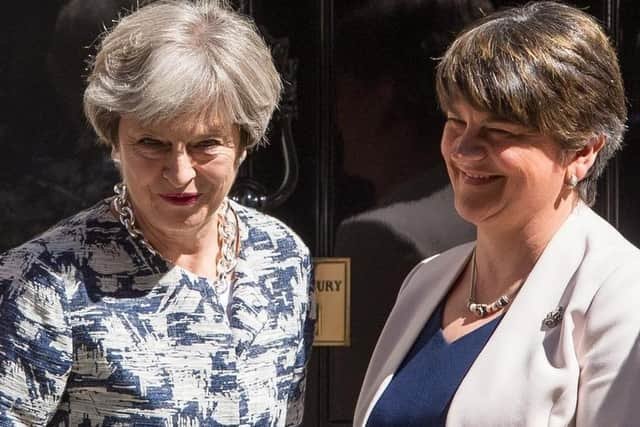Alex Kane: Playing blame game provides no answers to unionism’s problems


Every couple of weeks a new entry is added to the list. A complicit media; a nationalist dominated local media; individual journalists and commentators; the Alliance Party; pan-nationalism; the Irish government; the UK government; English nationalism; the EU; the NIO; Theresa May; Boris Johnson; elements within unionism; specific liberal/moderate unionists; elements within loyalism; academia; church leaders; non-voters; Nolan; Talkback etc, etc. Everyone will be included at some time, I suspect.
Last Friday’s Morning View in the News Letter contained this line: ‘The UK government has made clear that it will not stand up to republicans.’ That is an extraordinary admission from a newspaper whose readership is primarily pro-Union/unionist and whose comment pages are one of the few regular platforms available for a range of unionist/loyalist voices. But the admission (which is one I don’t disagree with, by the way) raises a huge question for unionism: if it cannot rely on the UK government to stand up to republicans and, in so doing, promote the interests of unionists in Northern Ireland, then to whom does it turn?
Advertisement
Hide AdAdvertisement
Hide AdWhen Boris Johnson built his Withdrawal Agreement around his support for a border in the Irish Sea he did so for two reasons: the vast majority of voters he was reaching to didn’t, according to a slew of opinion polls since late-2017, care one way or another if Northern Ireland remained in the UK; and he knew that agreeing to the border (and the accompanying constitutional changes) was the concession required for the nod of approval from the EU and the Irish government. Crucially, he also knew that his proposal would anger unionism in a way it hadn’t been angered since the Anglo-Irish Agreement in 1985. Yet he went ahead.


Meanwhile, most of the evidence emerging from the latest talks process suggests that it is the DUP which is coming under the greatest pressure to budge and concede. That was always going to be the case if it went into talks again, so why bother? Partly because it doesn’t really want another election (it would probably remain the largest party, although it is also probable that a few losses of UUP seats to Alliance would widen the gap between unionist and non-unionist seats, which presently stands at 40 unionists to 50 non-unionists); partly because it doesn’t want direct rule (trusting Johnson to promote and protect their interests is not an attractive option); and partly because it needs a power base (to make up for changed circumstances in Westminster).
There is another question which unionists must consider: what is UK policy for Northern Ireland? The constitutional guarantee is fairly straightforward, namely NI will remain part of the UK for so long as a majority wishes it. But what about the role of successive UK governments since 1970 in the prorogation of the Stormont Parliament in 1972; the mandatory power-sharing and ‘Irish dimension’ requirements in the 1972 Green Paper; Sunningdale and the Council of Ireland in 1974; the Anglo-Irish Agreement in 1985; the ‘no selfish strategic or economic interest ...’ doctrine of 1992/3; almost three decades of back-channel communications (dating back to 1972) with the IRA; on-the-run letters of comfort revelations; even the latest State Paper suggestion that Margaret Thatcher was increasingly opposed to the idea of sending young soldiers to NI only to be killed.
Many, many times in the years I have written for the News Letter (and I am grateful to successive editors for affording me the privilege and, of course, to all of you for continuing to read the column) I have raised the question about why so many prime ministers have seemed particularly reluctant to stand should to shoulder with unionists here. Ulster Unionist MPs took the Conservative Whip from 1921 until Edward Heath removed it in 1974; former UUP leader Jim Molyneaux backed Margaret Thatcher when she became leader in 1975; he propped up John Major during the Maastricht crisis in 1992; Reg Empey backed Cameron during the UCUNF pact in 2008-10; the DUP backed Theresa May and Boris Johnson from 2017-19. And for what? In what way did any of those PMs repay their support? And when challenged about their reluctance to be seen to stand shoulder to shoulder with unionism, the response was always a variation of, ‘We can’t be seen to take sides. Anyway, you’ve always got the constitutional guarantee to fall back upon’.
Advertisement
Hide AdAdvertisement
Hide AdWhich brings me back to those who blame everyone else for the problems unionism faces and to the Morning View observation. If the evidence suggests – which most of it does – that the present government, along with its predecessors, seems unwilling to face down republicanism (because it fears a return of IRA violence and a collapse of the peace/political process), then what does unionism do? More important, can unionism trust either this government or a successor a few years down the line to protect and promote its interests?
The biggest question of all: why do the interests of republicanism seem to take priority over the interests of unionism in Northern Ireland? Is unionism failing to make an attractive case for itself and win and retain ‘friends in high places’; or is it simply the case that our supposed fellow-unionists across the rest of the UK, particularly in Westminster, don’t care enough about us to go the extra mile?
Many readers will, understandably, be uncomfortable with these questions. So be it: but you know me well enough by now to know that I don’t shy away from uncomfortable questions. And, as I’ve said so often before, unionism needs to acknowledge and address the uncomfortable questions, rather than simply ignoring them or, in some cases, opting for the much easier (although ultimately pointless) response of just finding someone to blame. Blaming is a doddle. Producing coherent responses and strategies is much more difficult; yet much more important.